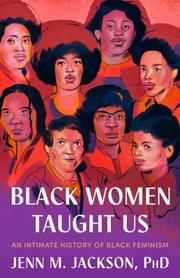Jackson, a political science professor and columnist for Teen Vogue, presents these 11 essays as “love letters” to influential Black women “who built our movements and taught us how to love ourselves whole.” The author links their personal history with a vital tradition of intellectualism and activism spanning nearly two centuries. Jackson considers celebrated figures such as Harriet Jacobs, Zora Neale Hurston, and Audre Lorde, but they also examine less well-known ones, including Fannie Lou Hamer, Shirley Chisholm, and members of the Combahee River Collective. In each case, Jackson explores the experiences and achievements of influential Black feminists as a means of charting historical continuities in an ongoing struggle for liberty and equality. The orienting insights provided by Black women’s storytelling is a consistent point of emphasis. As Jackson notes the impact of Toni Morrison’s writing on their own self-understanding, “There was a sense of inner knowing and outer recognition of being Black and of living Blackly without regard for a white world that would no doubt want to co-opt, water down, and erase our stories.” The author’s historical summaries provided are perceptive and engaging, as are the analyses of current battlegrounds over so-called “identity politics.” Jackson offers intriguing, if occasionally underdeveloped, commentary on the significance of intersectionality in understanding systemic oppression, the dynamics of respectability politics, and the dimensions of the prison industrial complex. Also suggestive is the author’s take on the motivations behind conservatives’ outrage over critical race theory and the stakes involved in debates over how American history is taught. Overall, this “intimate history” ably highlights the longstanding importance and contemporary relevance of Black feminism, as well as the challenges that remain in having its voices heard and acted upon properly.

